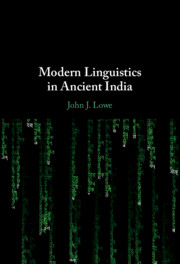Book contents
- Frontmatter
- Contents
- Acknowledgements
- Glossary
- List of Abbreviations
- Texts and Authors
- The Sanskrit Transcription System
- 1 Introduction
- 2 The Aṣṭādhyāyī at Work
- 3 Rule Interaction
- 4 Morphological Systems
- 5 Syntax: Argument Structure
- 6 Formal Language Theory and Computational Power
- 7 Semantics and Pragmatics: Compositionality and the Relation between Grammar and Meaning
- 8 Phonology: Phonemes and Writing Systems
- 9 Conclusion
- References
- Subject Index
- Author Index
- Index Locorum
- Word Index
6 - Formal Language Theory and Computational Power
Published online by Cambridge University Press: 14 March 2024
- Frontmatter
- Contents
- Acknowledgements
- Glossary
- List of Abbreviations
- Texts and Authors
- The Sanskrit Transcription System
- 1 Introduction
- 2 The Aṣṭādhyāyī at Work
- 3 Rule Interaction
- 4 Morphological Systems
- 5 Syntax: Argument Structure
- 6 Formal Language Theory and Computational Power
- 7 Semantics and Pragmatics: Compositionality and the Relation between Grammar and Meaning
- 8 Phonology: Phonemes and Writing Systems
- 9 Conclusion
- References
- Subject Index
- Author Index
- Index Locorum
- Word Index
Summary
This chapter investigates why Pāṇini has been called the world’s first computational linguist and situates Pāṇinian grammar within the context of formal language theory and issues of generative capacity, which have been of huge importance in the development of modern linguistic theory since Chomsky's earliest work. Existing claims regarding the generative capacity of Pāṇini’s system are shown to be inadequate, and a new assessment of the power of the Aṣṭādhyāyī is provided.
Keywords
- Type
- Chapter
- Information
- Modern Linguistics in Ancient India , pp. 137 - 164Publisher: Cambridge University PressPrint publication year: 2024

